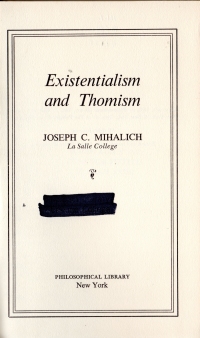 This book is a Thomist critique of Existentialism. Ho, boy, let’s get into some weeds.
This book is a Thomist critique of Existentialism. Ho, boy, let’s get into some weeds.
Thomism is a philosophical system based on the works of St. Thomas Aquinas, a monk from the 13th century who wrote several thousand pages of reasoning including Summa Theologica. The philosophy is the only philosophy taught officially in the Catholic church’s seminaries and whatnot. The university I went to was apparently a hotbed of Thomism in the 1950s, or so I heard, but it did teach other systems of thought to its students. Including Existentialism. At any rate, this book looks like it’s still in print 55 years later, and that’s probably mostly because of its role in teaching Existentialism to bishops and Jesuits. But it could partly be because it’s fairly accessible.
This book is short (88 pages) and collects five separate essays that target some places where Existentialism is systemized. The essays include:
- “Some Aspects of Freedom in Sartre’s Existentialism” which talks about Sartre’s view of human existence and its freedom to be for itself.
- “Gabriel Marcel’s Ontology of Love” which talks about Marcel’s take on the interconnectedness of human experience. Let’s be honest: whenever the phrase ontology of love appeared, I heard it in Barry White’s voice.
- “Mood and Cognition in Heidegger and Sartre” which discusses the importance of mood and emotion as the starting point for cognition in Heidegger and Sartre and how little beyond those base and concrete elements the Existentialists could move.
- “Husserl and the Rise of Continental Existentialism” which talks about Husserl’s theories and how they coincide and conflict with the Existentialist mindset: namely, the importance of phenomenonism and its importance, but how Husserl’s “reductions” of the phenomena would be rejected because they abstract the phenomena away from the subject perceiving them.
- “Thomism and the Challenge of Existentialism” is the heart of the criticism, and it explores a bit how Existentialism rebels against philosophical systems that focus on the abstract and the reasoned over the experience and subjective nature of cognition itself. It claims that Existentialism is essentially (see what I did there?) fighting a straw man, as so many other philosophical systems including the perfect Thomism derive those abstractions by reasoning from individual experience and perception and by balancing intellect with the emotions. It puts the finger on why I’ve only considered myself an Existentialist in bad moods: it really doesn’t go beyond the subjective in creating or describing reality and can’t because if it does, it threatens the subjectivism that’s very important to it.
- “Existentialism in The Outsider“, the last chapter, seems a bit like an add-on. It takes to task an Existentialist novel by a British writer; you’re forgiven if you thought it was about The Stranger which appeared in Britain as The Outsider. Side note: This essay originally appeared in RENASCENCE, a Thomist publication at Marquette University, that hotbed of Thomism in the 1950s. At any rate, the essay rails a bit about this novel and its weak underpinings and defense of the Beatniks, those kids with their “eccentric dress and wild demeanor”. Given that novels obscurity, I have to wonder if this chapter made it into later editions.
I’m normally a primary source kind of fellow, so I’ve some familiarity with the Sartre mentioned above, and I’ve heard the names Heidegger, Hegel, and Husserl in my college classes. Heck, I might even have read them.
But it’s refreshing to pick up a criticism of the philosophy. It takes one out of the philosophy, so to speak, to see what someone else thinks of it, which can be clarifying. Of course, one must not take the critic’s depiction of the philosophy under study as the definitive representation of the philosophy. It’s another perspective on it.
So if you’re into Existentialist thought or explore it a bit, this book can serve that role for you quite nicely. It’s approachable, but it does get into deeper analysis of cognition, perception, and reality. It’s not too heady for most of it if you’re just a lightweight Existentialist who has read The Stranger and Nauseau and never even tried Being and Nothingness (I did just that: try), and the stuff that is heady does lean a little on you already knowing some terms of philosophy, so it’s not too hard to follow and even understand.
Recommended.
Books mentioned in this review:


